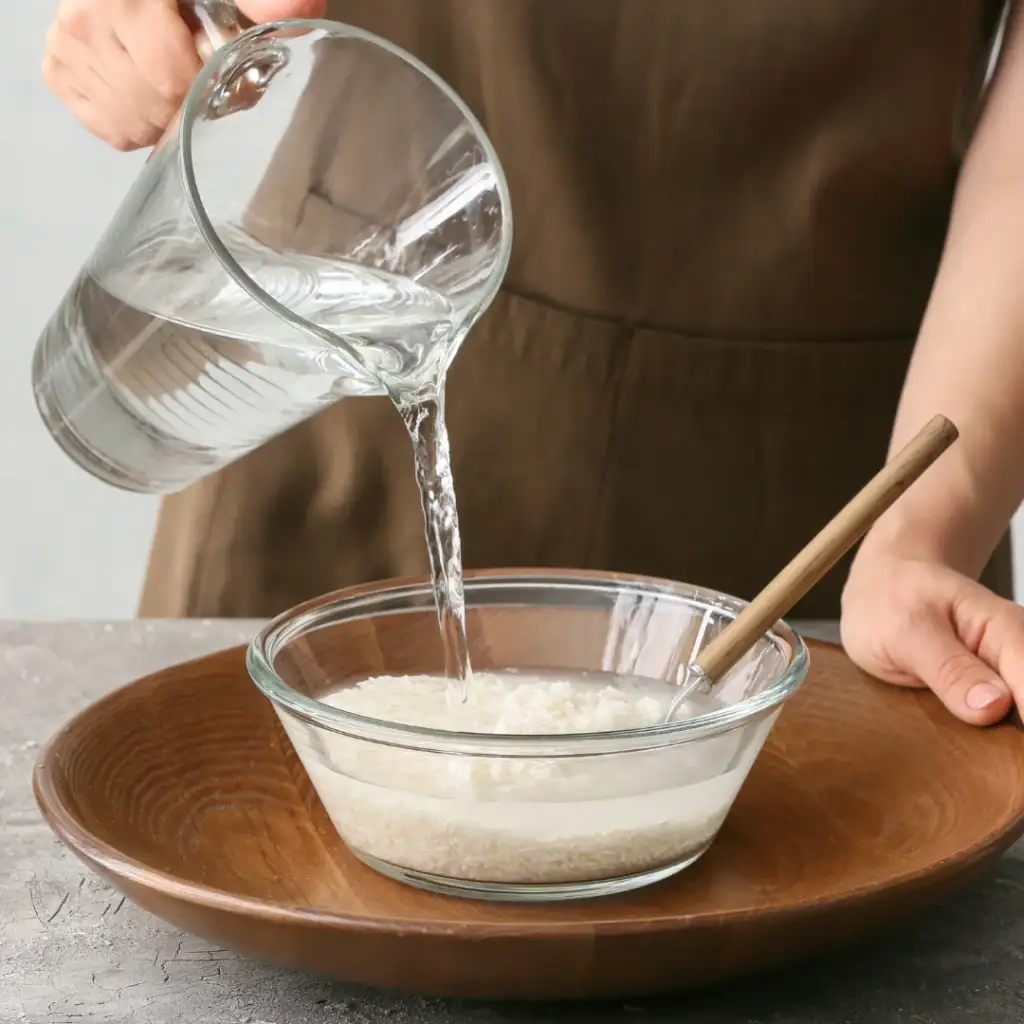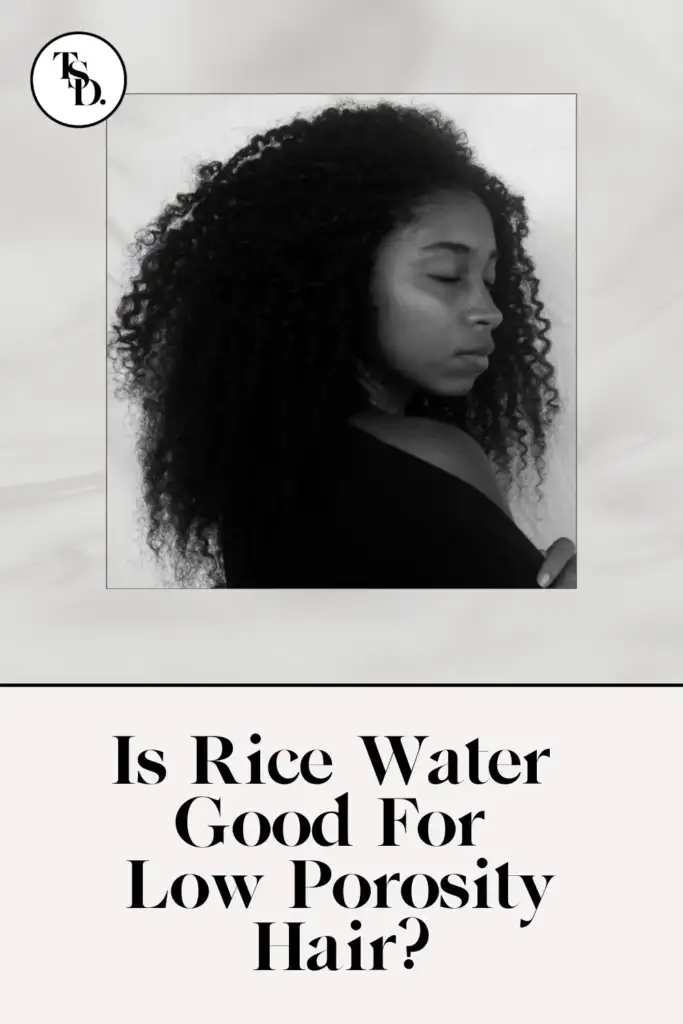Heads up! We may use affiliate links in this post. You'll never pay more, but we might earn a small commission if you buy - thanks for supporting us! See our full disclosure here.
In the ever-evolving world of natural hair care, it seems like there’s always a new miracle ingredient promising to transform our tresses.
One such trend that’s been making waves (pun intended) is rice water.
This ancient beauty secret, used for centuries in Asian cultures, has recently captured the attention of TikTok residents as well as those who love experimenting with real homemade products worldwide.
But here’s the million-dollar question: is rice water good for low porosity hair?
If you’re scratching your head wondering what low porosity hair even is, don’t worry – we’ll tell you all about it.
And if you’re already familiar with your hair’s porosity but are curious about whether rice water should earn a spot in your hair care routine, keep reading.
But before we answer whether rice water is good for low porosity hair, let’s make sure we’re all on the same page.
What Is Low Porosity Hair?
Low porosity hair has a unique structure where the cuticles (the outermost layer of the hair shaft) are tightly closed and lie flat.
This characteristic makes it challenging for moisture and products to penetrate the hair shaft. If you’ve ever felt like hair products just sit on top of your hair rather than being absorbed, you might have low porosity hair.
YOU MIGHT LIKE THESE TOO:
- Step-By-Step Guide On How To Make Rice Water For Hair Growth
- How To Do An Apple Cider Vinegar Hair Rinse
- Does Low Porosity Hair Need Protein? Let’s Break It Down!
Characteristics of Low Porosity Hair:
- Takes a long time to get wet and dry
- Prone to product buildup
- May be resistant to chemical treatments
- Often appears shiny when healthy
- Can be challenging to moisturise effectively
Understanding your hair’s porosity is crucial for developing an effective hair care routine. It helps you choose the right products and techniques to keep your hair healthy and vibrant.
What Is Rice Water?

Now that we’ve covered low porosity hair, let’s talk about rice water. This simple, natural ingredient has been used for hair care in various Asian cultures for centuries, particularly in China, Japan, and Southeast Asia.
Rice water is the starchy liquid left over after soaking or cooking rice. It’s rich in various nutrients that can potentially benefit your hair and skin.
What Rice Water Contains:
- Vitamins B and E
- Minerals like magnesium, potassium, and zinc
- Amino acids
- Antioxidants
- Inositol, a carbohydrate that may help strengthen hair
Rice Water and Low Porosity Hair: The Pros and Cons
Now, let’s address the big question: is rice water good for low porosity hair? As with many things in hair care, the answer isn’t a simple yes or no.
Let’s break down the potential benefits and drawbacks.
Pros of Using Rice Water on Low Porosity Hair:
- Potential for Improved Hair Strength: The proteins and amino acids in rice water may help strengthen the hair shaft, potentially reducing breakage.
- Enhanced Shine and Smoothness: Rice water can potentially smooth the hair cuticle, leading to shinier, smoother-looking hair.
- Possible Growth Promotion: Some users report increased hair growth when using rice water regularly, though more scientific research is needed to confirm this effect.
- Scalp Health: The vitamins and minerals in rice water might contribute to a healthier scalp environment, which is crucial for overall hair health.
Cons of Using Rice Water on Low Porosity Hair:
- Risk of Protein Overload: Low porosity hair is often sensitive to protein. Since rice water is rich in protein, overuse could lead to protein overload, resulting in dry, brittle hair.
- Potential Buildup: The proteins in rice water may accumulate on the hair shaft over time, especially given low porosity hair’s tendency to resist absorption.
- Possible Increased Dryness: If not balanced with adequate moisture, the protein in rice water could exacerbate the dryness that low porosity hair is prone to.
- Time-Consuming: Preparing and applying rice water adds an extra step to your hair care routine, which might not be sustainable for everyone.
Other Posts About Low Porosity Hair:
- Got Low Porosity Hair? These Are The Best Oils To Use!
- 5 DIY Hair Masks For Low Porosity Hair
- Stay Away From Coconut Oil, Shea Butter, Mineral Oil And Olive Oil If You Have Low Porosity Hair, Here’s Why
Incorporating Rice Water Into Your Low Porosity Hair Care Routine
If you’re intrigued by the potential benefits of rice water and want to give it a try, here are some tips for incorporating it safely:
- Start Slowly: Begin by using rice water once every two weeks. This allows you to monitor your hair’s response without risking overload.
- Balance with Moisture: Always follow your rice water treatment with a moisturising deep conditioner. This helps balance the protein with hydration, which is crucial for low porosity hair.
- Pay Attention to Your Hair: Monitor your hair closely for signs of protein overload, such as increased dryness, brittleness, or a straw-like texture. If you notice these signs, reduce the frequency of rice water treatments or discontinue use.
- Use the Right Technique: Apply rice water to freshly washed, damp hair. Focus on the lengths and ends, which are typically the most damaged parts of the hair.
- Don’t Overdo It: Even if you see positive results, resist the temptation to use rice water more frequently than once a week. Remember, with low porosity hair, less is often more.
DIY Rice Water Recipe
Want to try making your own rice water? Here’s a simple recipe:
Ingredients:
- 1/2 cup of uncooked rice (any type)
- 2 cups of water
Instructions:
- Rinse the rice thoroughly to remove any dirt or impurities.
- Place the rinsed rice in a bowl and add 2 cups of water.
- Let the rice soak for 30 minutes to 2 hours. The longer it soaks, the more concentrated the rice water will be.
- Strain the rice, reserving the water.
- Store the rice water in a clean, airtight container in the refrigerator for up to one week.
Application:
- After shampooing, pour the rice water onto your hair and scalp.
- Gently massage it in for a few minutes.
- Leave it on for 5-10 minutes.
- Rinse thoroughly with cool water.
- Follow with a moisturising conditioner.
The Verdict
Rice water can potentially benefit low porosity hair when used correctly and in moderation.
Its protein content may help strengthen hair and reduce breakage, while its other nutrients could contribute to overall hair health.
Just remember, what works for one person’s hair type might not work for another, even within the category of low porosity hair.
It’s crucial to pay attention to how your hair responds and adjust your routine accordingly.
If you experience any adverse effects such as increased dryness, brittleness, or scalp irritation, discontinue use and consult a hair care professional. They can provide personalised advice based on your specific hair needs and concerns.
Save on Pinterest for later?

FAQs
Q. How often should I use rice water on my low porosity hair?
A. Start with once every two weeks and adjust based on your hair’s response. Never use it more than once a week.
Q. Can rice water help with hair growth for low porosity hair?
A. While some users report improved growth, scientific evidence is limited. Rice water may support a healthy scalp environment, which could indirectly promote growth.
Q. Can rice water cause protein overload in low porosity hair?
A. Yes, if used too frequently or without proper moisture balance, rice water can lead to protein overload in low porosity hair.
Q. Can I leave rice water in my hair overnight?
A. For low porosity hair, it’s generally not recommended to leave rice water in overnight as it may lead to protein overload.
Final Thoughts
In conclusion, rice water can be a valuable addition to your low porosity hair care routine when used mindfully.
By understanding your hair’s unique needs and responding to how it reacts to rice water, you can harness the potential benefits of this natural treatment while avoiding its pitfalls.
Have you tried rice water on your low porosity hair? We’d love to hear about your experience in the comments below!

